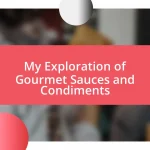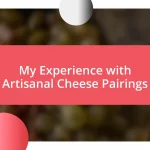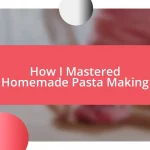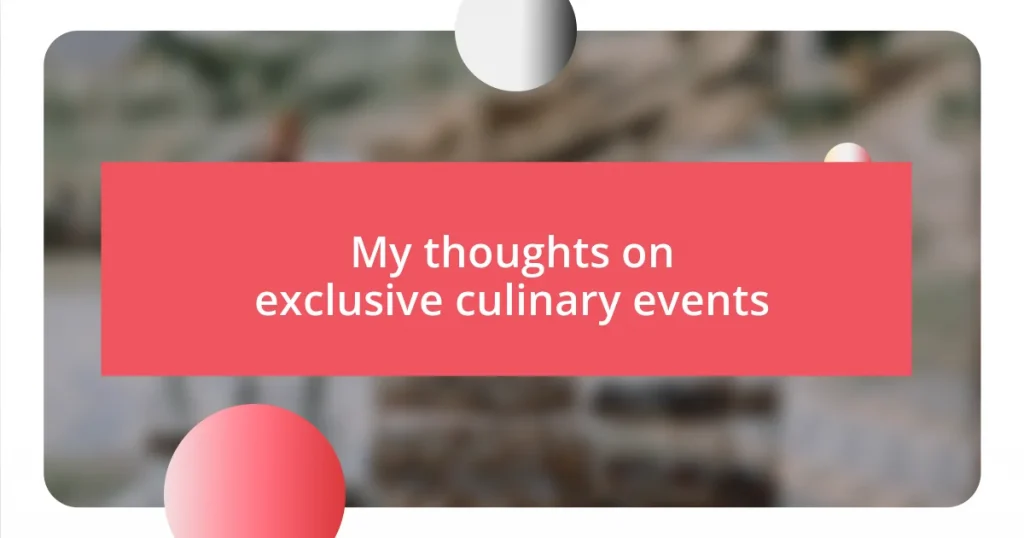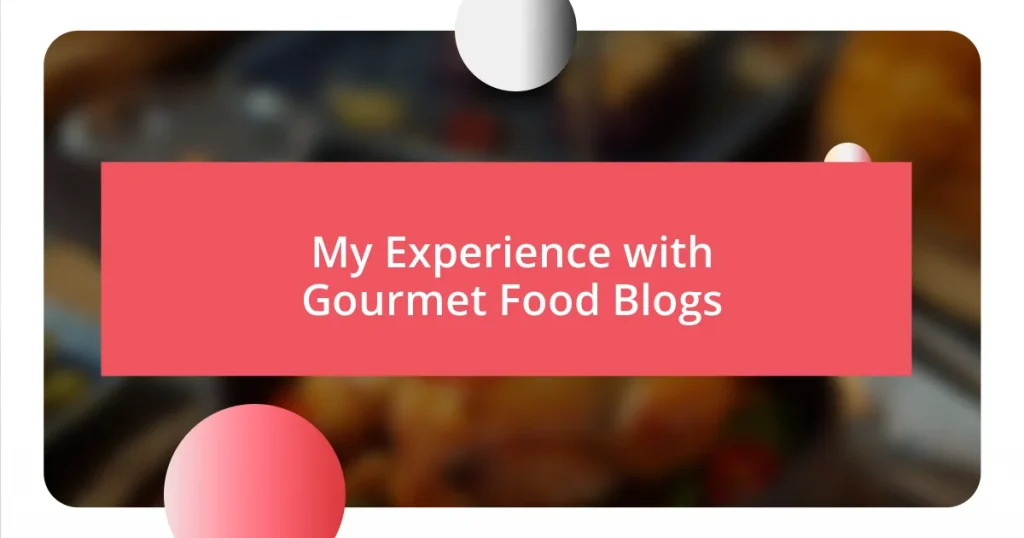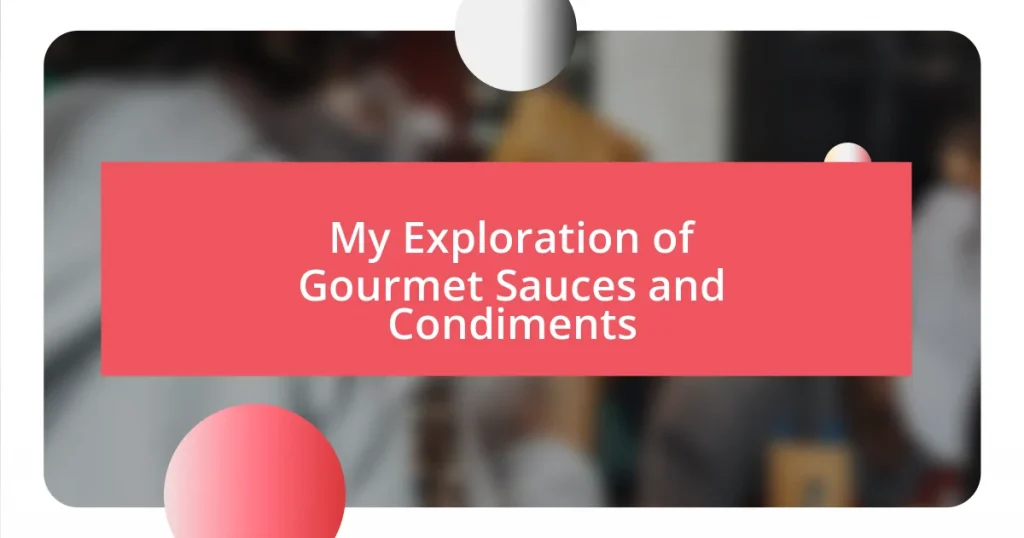Key takeaways:
- Exclusive culinary events offer unique experiences with renowned chefs, fostering connections and deepening appreciation for food and culture.
- Diverse types of events such as chef’s table dinners, tasting menus, and cooking classes enhance interactions and learning about culinary arts.
- Networking at these events can lead to valuable relationships and collaborations, enriching personal culinary journeys and expanding knowledge in the field.
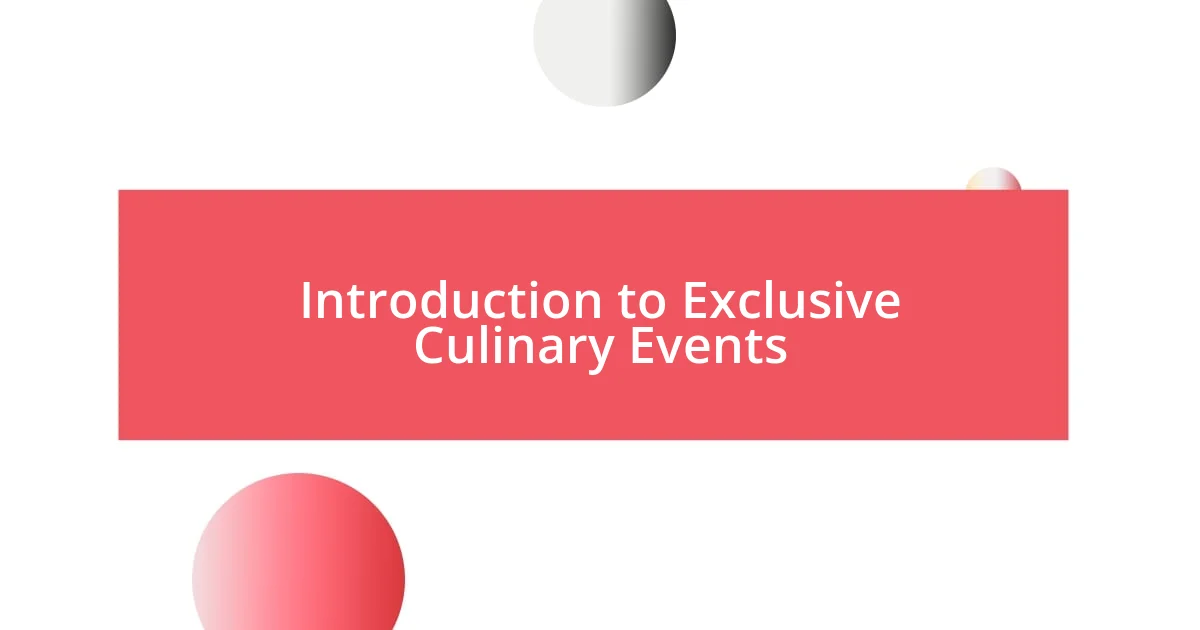
Introduction to Exclusive Culinary Events
Exclusive culinary events are like hidden gems in the foodie world, offering unique experiences that tantalize your palate and awaken your senses. I remember the first time I attended a private wine and food pairing dinner; the intimacy of the gathering made every bite and sip feel special, as if I was part of something extraordinary that few others could access.
These events often feature renowned chefs and one-of-a-kind menus, creating an atmosphere of excitement and anticipation. Don’t you feel that thrill when you know you’re about to try a dish that isn’t on any restaurant menu? For me, it’s a reminder of why I love culinary adventures—the opportunity to experience creativity and passion on a plate, almost like art.
Attending these exclusive gatherings isn’t just about the food; it’s about forming connections with chefs, fellow food lovers, and even the ingredients themselves. I often find myself engaging in conversations that go beyond casual dining, exchanging stories and laughter over the intricacies of flavor and technique. It transforms the meal into a shared experience, elevating it beyond mere sustenance and into a celebration of culinary culture.
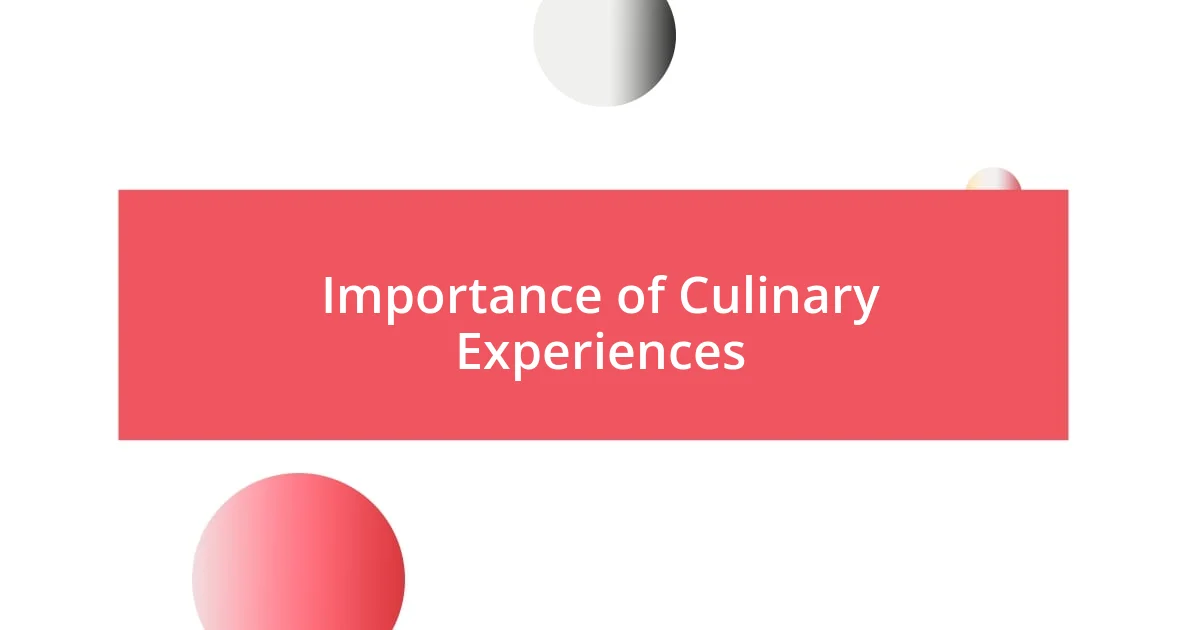
Importance of Culinary Experiences
Culinary experiences hold immense significance, as they allow us to explore diverse cultures through food. I recall a vibrant dinner themed around the flavors of Thailand, where each dish told a story of its own. It was enlightening to discover how each ingredient contributed not just to taste but also to the cultural narrative, and that deepened my appreciation for the culinary arts.
- They create lasting memories through shared experiences with friends and family.
- They enhance our understanding of global cuisines and traditions.
- Engaging with chefs provides unique insights into the artistry and techniques behind the dishes.
- Exclusive events offer a chance to try rare ingredients and dishes rarely found elsewhere.
- They foster community, allowing food enthusiasts to connect over a shared passion.
Ultimately, culinary experiences blend taste, culture, and community, making every event unforgettable.
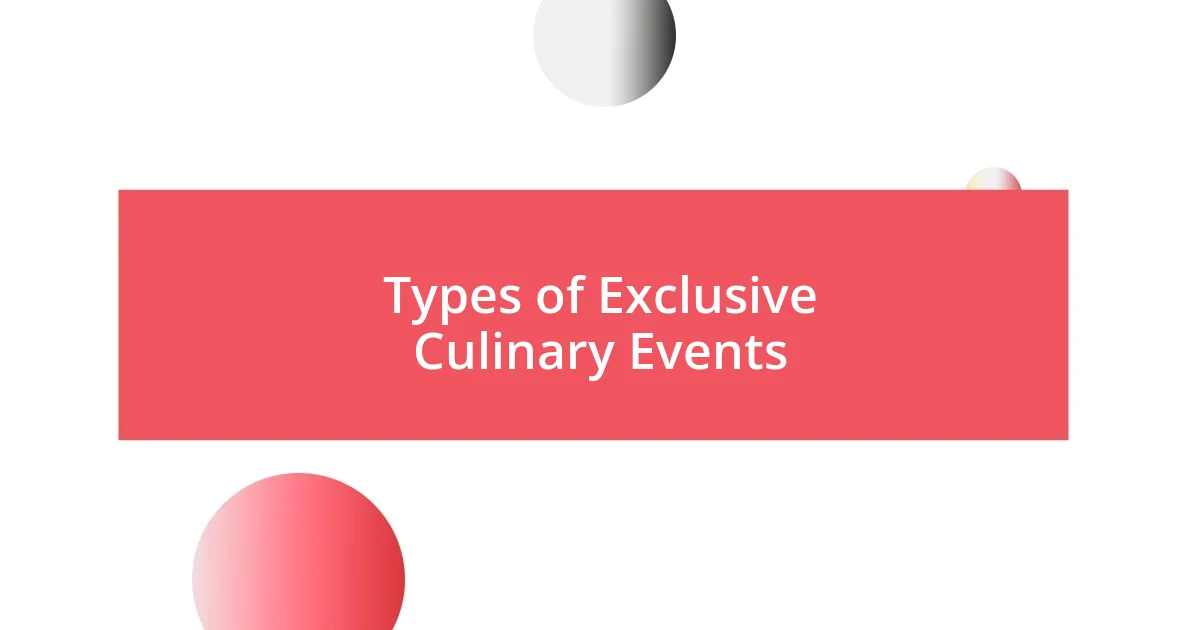
Types of Exclusive Culinary Events
Exclusive culinary events come in various forms, each providing a distinctive experience. For instance, chef’s table dinners allow diners to sit directly with the chef, unfolding stories and techniques behind the dishes as they savor every bite. I remember that feeling of awe during a chef’s table experience where the chef explained the inspiration behind each course—it made the meal feel deeply personal and utterly fascinating.
Another popular type is the exclusive tasting menu, often featuring a multi-course meal crafted from seasonal or rare ingredients. These menus can take you on a journey, where every plate is like a chapter of a book. I once attended a tasting menu event focused on foraged ingredients, and it was exhilarating to taste things I had never come across before. It awakened my senses and made me appreciate the local environment in an entirely new way.
Cooking classes led by acclaimed chefs also fall under this umbrella, offering an interactive twist to the culinary experience. Participating in one such class, I found myself immersed in the joy of creating pasta from scratch alongside an expert. This hands-on approach not only enhanced my skills but also deepened my connection to the culinary world, proving that the journey of learning is just as engaging as the final dish served.
| Type of Event | Description |
|---|---|
| Chef’s Table Dinners | Intimate gatherings where diners enjoy a meal directly with the chef, often learning the stories behind the dishes. |
| Exclusive Tasting Menus | Multi-course meals that highlight seasonal or rare ingredients, creating a sensory journey for the palate. |
| Cooking Classes | Interactive sessions with renowned chefs, allowing participants to learn and create dishes hands-on. |

Planning Your Culinary Experience
When planning your culinary experience, consider what ignites your passion for food. For me, it often starts with the theme of the event. I once found myself captivated by a pop-up dinner celebrating the fiery flavors of spicy cuisines from around the world. The anticipation of what each course would bring was like opening a series of surprise gifts, each more delightful than the last.
Think about the company you’d like to share your experience with. I’ve discovered that attending these events with friends who share similar tastes amplifies the enjoyment. I still remember the laughter and storytelling that flowed during a wine and cheese pairing event, where each sip and bite sparked joyful conversations, blending flavors and memories seamlessly. Wouldn’t you agree that sharing such culinary adventures makes them even more memorable?
Lastly, don’t hesitate to reach out to the chefs or organizers beforehand. A few weeks ago, I attended a private dinner where the chef graciously shared the inspiration behind her dishes. It transformed my understanding of the meal and created an intimate connection. Asking questions can lead to unexpected insights and enrich your experience, enhancing the way you appreciate each bite.
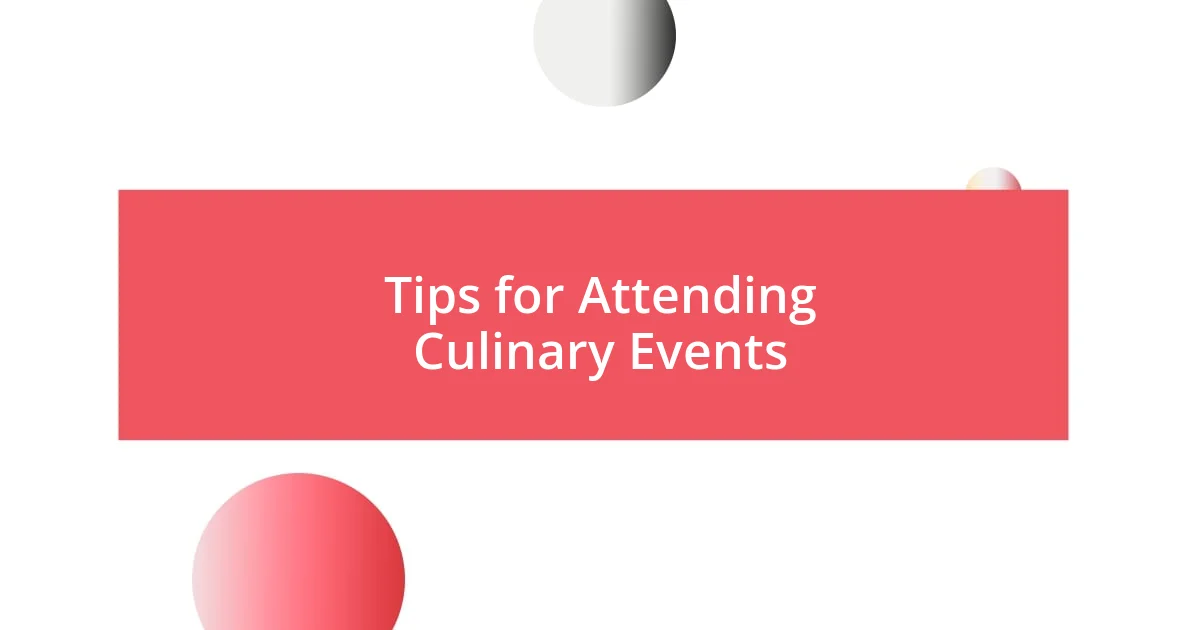
Tips for Attending Culinary Events
Attending culinary events can feel exhilarating, but preparation is key. I always check the event schedule in advance to see if there’s a guest chef or a unique theme I need to know about. For example, at one event I attended focused on sustainable seafood, understanding the importance of the ingredients really heightened my appreciation for the dishes. What details could you uncover that might enrich your experience?
When you arrive, take a moment to soak in the atmosphere rather than rushing to the first dish. I remember being overwhelmed at my first exclusive tasting event and quickly diving into courses, but I learned that pausing to appreciate the presentation and ambiance made my experience deeper. Have you ever thought about how the environment can enhance your senses during a meal?
Finally, don’t be shy about mingling with fellow attendees. I once met a pastry chef at an event who was more than willing to share tips on crafting desserts. Our conversation turned into an informal mini-masterclass right there at the table. Engaging with others not only opens up new perspectives but can spark connections that last well beyond the evening. Who knows what insights or friendships await you?
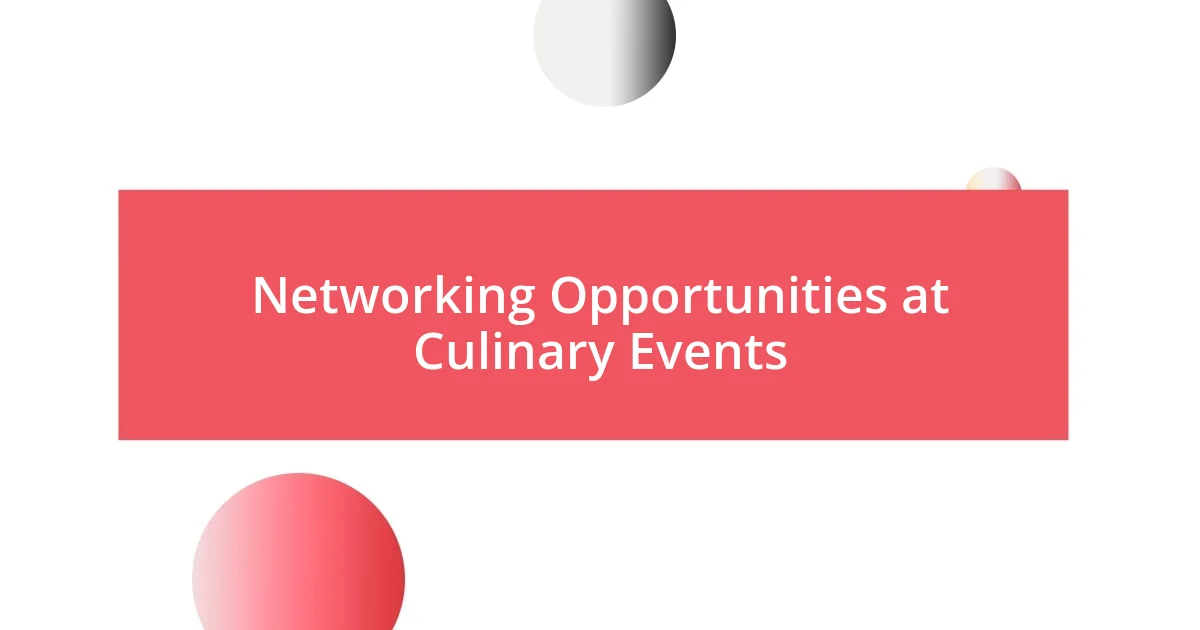
Networking Opportunities at Culinary Events
Networking at culinary events can be an incredible experience. I remember attending a gourmet festival where I struck up a conversation with a local food critic. We talked about everything from unique flavor combinations to hidden gems in the city. That chance encounter not only expanded my culinary knowledge but also led to collaborations that have significantly impacted my food journey. Who knew a simple chat could blossom into such meaningful connections?
I often find that culinary events offer the perfect backdrop for forming relationships. For example, at a farm-to-table dinner, the communal seating encouraged guests to mingle. I sat next to an aspiring chef who shared her ambition of launching her own restaurant. We brainstormed ideas together, and a week later, she sent me a recipe that utilized local ingredients. Moments like these highlight the power of networking in an environment designed for shared passion.
Don’t underestimate the value of exchanging experiences with others in the industry. At a recent wine pairing event, I met a seasoned sommelier who shared his insights on food and wine pairings that went beyond basic guidelines. Reflecting on that conversation, I realized the importance of dialogue in enhancing culinary knowledge. How often do we miss out on rich insights just because we hesitate to initiate a conversation? Diving into these discussions not only broadens our horizons but also instills a sense of community in the culinary world.


